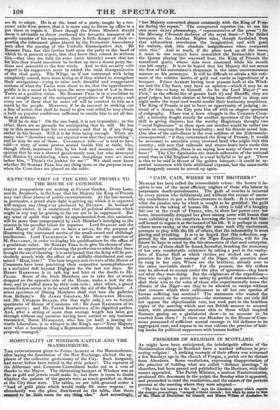"CAIN, CAIN, WHERE IS THY BROTHER?"
MURDER has been called the irremediable crime : the horror it in- spires is one of the most efficient engines of those who labour to perpetuate death-punishments. The guilt of murder is incurred by every person who deliberately and without the excuse of neces- sity contributes to put a fellow-creature to death. It is no matter what the passion may be which is sought to be gratified: the guilt consists in the taking of human life. A story is told of a haughty fair one at the court of France, who, to show her power over her lover, intentionally dropped her glove among some wild beasts that were exhibiting to the courtiers, knowing the lover would feel him- self bound to regain it at the hazard of his life. It is perhaps in cases where mere vanity, or the craving for some such silly excitement, prompts to play with the life of others, that the inhumanity is most glaring and revolting. It is to be hoped that this reflection, sug- gested by the termination of the Niger Expedition, will for the future be kept in mind by the fair promoters of that mad enterprise. If any one of them shall be found, hereafter, breaking the monotony of her own comfortable existence by taking a part in the vanity- fairs of Exeter Hall at which victims are decked out in pre- paration for the Upas swamps of the Niger, this question must be rung in her ears, Where are thy brethren, already sent to the same inevitable death ? For the present, the fair triflers may be allowed to escape under the plea of ignorance—they knew not what they were doing. But the originators of the expedition they who sought to prove its safety by garbled statements—who shut their ears to the voice of those who experimentally knew the climate of the Niger—are they to be allowed to escape without that censure which their callousness to all but one species of' human suffering has merited ? The statesmen who wasted the public money on the enterprise—the statesmen who not only did not oppose the objectionable vote, but took part in the heartless orgies of the meeting which sent out British seamen to assured death, with pleasurable emotions akin to those which inspired Romans gazing on a gladiatorial show—is no account to be exacted from them ? Is there one Member in the House of Com- mons possessed of sufficient mental courage to bid defiance to its aggregated cant, and expose in its true colours the practice of bait- ing hooks for political supporters with human bodies ?


























 Previous page
Previous page